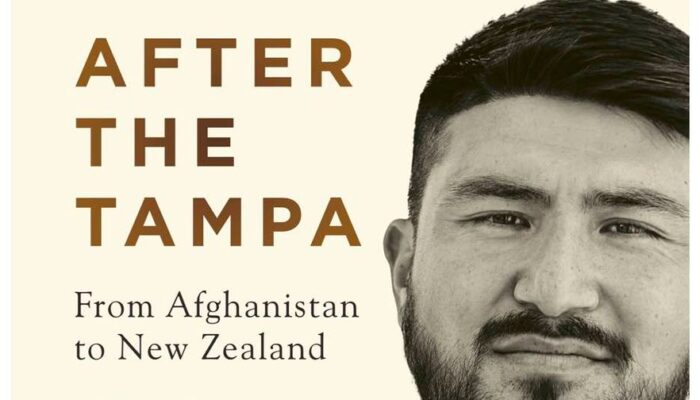Book Review: After the Tampa – Abbas Nazari
‘After the Tampa: From Afghanistan to New Zealand’ by Abbas Nazari, Allen and Unwin, 2021, 367 pages
This is a well-written account by a young Afghan refugee (now 27 years old) of his remarkable life, and the insights he’s gained on how the world works, and could work better.
Abbas Nazari is modest enough to say that he felt a fraud when asked to write the book, yet his gameness to try all sorts of jobs and studies, his hard work at school and sport, and the award of a Fulbright scholarship to Georgetown University tells us he under-rates himself. The book is very accessible to readers curious about the culture and history of his country as “the graveyard of empires”, and the global ecology of the refugee system, including Australia’s place in it. He gives much detail about how his family lived as a part of the persecuted Hazara ethnicity, and their many dramatic moments along the way to security, ultimately in New Zealand. His disarming openness will make the most sceptical reader pause before answering the question: “What would I do differently in his situation?”
His family and hundreds of other asylum seekers, were rescued from their sinking boat by the MV Tampa (a Norwegian container ship) in August 2001, at a time when the Howard government’s hostile response to refugees turned this into a symbolic event. Earlier that week, two SIEVs (Suspected Illegal Entry Vessels) had reached Christmas Island, and politicians and bureaucrats in Canberra were anxious to stop any more, although it was the nearest port, and maritime law obligated rescue and deployment there. A mass breakout at Woomera detention centre the year before, and steadily increasing numbers of detainees had moved refugee issues to greater public attention. This was the government’s chance to demonstrate control for domestic political gain, and pander to the nastiness stirred up by racist influences. (A recent paper by Professor Klaus Neumann provides nuance and some contradiction of the prevailing narrative here.) Their choice to go down the low road encouraged a less generous view amongst Australians of the worth of refugee lives, an enduring legacy of weak political leadership. It also told the world that Australia’s future policy towards refugees was to be harsher, inspiring reactionary leaders overseas to the present day.
Students of this important historical event will be interested in Nazari’s eye-witness account (supplemented by his parents and other rescuees who were present) of the tug of war between the Australian, Indonesian, and Norwegian parties. The crux of the conflict was Captain Arne Rinnan’s determination to implement his life-saving duty, versus Canberra’s attempt to refuse entry to Christmas Island, in order to shift responsibility for the refugees’ future to Indonesian authorities. Rinnan was later honoured by the UN and maritime bodies for his leadership and courage. Australia implemented a forced boarding by about 50 armed SAS commandos to prevent the Tampa from landing, and a further blockade, with new legislative backing. Other major consequences were New Zealand’s offer to take 150 families and children, and Howard’s deal with Nauru for a “Pacific solution.” About 150 of the 433 asylum seekers were resettled in New Zealand, including Nazari’s family.
He documents how the refugees were not passive spectators of this international diplomatic event, but banded together to represent their deteriorating medical situation to Captain Rinnan, and to present their asylum request to the Norwegian Ambassador, who had visited the ship (Rinnan has said on numerous occasions that the pressure from the refugees was never decisive in his decision-making). Peter Mares, who wrote the highly-regarded book “Borderline” about these events, recently interviewed Abbas Nazari, Australian political leaders at the time, and the MV Tampa’s chief mate in this ABC podcast.
Nazari’s recent Australian National Press Club address about the book suggests an exceptional high-achiever, yet his siblings trained and qualified in medical and engineering fields, and his father set up a major auto parts trading company in NZ. So an alternative view could be that, in the positive environment provided by New Zealand, a hardworking and mutually supportive family, with no prior education but with an inner drive from deprivation, can achieve great things. Within a decade of their arrival, many Afghanis owned their own house, and were prominent in business and technical trades, and civic participation.
Nazari sees other important factors too, including language and cultural education about the old country. Being voiceless, unemployed and welfare-dependent was demoralising to many older Afghans who struggled with the new thinking necessary to flourish. Identity and belonging can’t be bestowed by government, and the Afghan community in Christchurch gained confidence and status by providing it themselves. It’s interesting to hear him nine years ago, as a teenager giving a TEDx talk, where he spoke about his own return to Afghanistan as an almost out-of-body experience, awakening childhood attachments.
Writing before the fall of Kabul this year, Nazari reports his imaginative aspirations for Afghanistan’s future after his second visit in 2017. He’s also someone who gives back: the admirable Abbas has promoted World Vision’s Kids off Nauru campaign. Perhaps the Georgetown University post-graduate education has also helped him with the ‘big picture’: he sees the Christchurch gunman as an extreme end of the ethno-nationalism increasingly influential globally, and needing careful response. It will be interesting to see the future activities of this talented young man.
Kevin Bain’s refugee reading guide is at Bayside Refugee Support.
